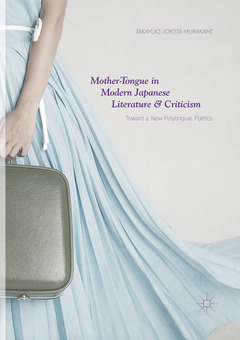Description
Mother-Tongue in Modern Japanese Literature and Criticism, Softcover reprint of the original 1st ed. 2018
Toward a New Polylingual Poetics
Author: Yokota-Murakami Takayuki
Language: English
Subject for Mother-Tongue in Modern Japanese Literature and Criticism:
Approximative price 60.12 €
In Print (Delivery period: 15 days).
Add to cartPublication date: 12-2018
Support: Print on demand
Approximative price 84.39 €
In Print (Delivery period: 15 days).
Add to cartPublication date: 08-2018
Support: Print on demand
Description
/li>Biography
/li>Comment
/li>
Examines the notion of “mother-tongue” in Japanese literature and literary criticism
Considers modern Japanese literature and literary criticism through modern philology, the vernacularization movement, and Korean-Japanese literature
Reveals the political problems of the notion of “mother-tongue” in literary and linguistic theories




